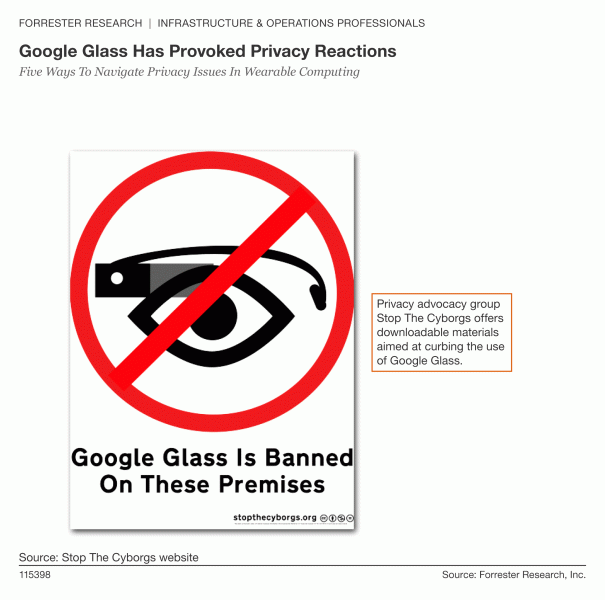Privacy Won’t Derail Wearables, But Could Undermine Your Company
Wearables are opening up exciting new scenarios for consumers and enterprise users alike, but the wider conversation on wearables has taken a privacy-oriented turn. The New York Times and WIRED, among others, have covered the emerging privacy concerns associated with wearable devices.
Particular ire has developed against Google Glass. An online activist group, Stop the Cyborgs, opposes Google Glass and related wearables, which the organization says will "normalize ubiquitous surveillance." Stop the Cyborgs offers downloads of anti-Glass graphics for posting in public places and online to spread the message that wearables are inherent privacy violators.

In a major new Forrester report, we present data and insights to help Infrastructure & Operations professionals who are piloting or planning to trial wearables navigate the privacy waters. As a teaser, here are some of our findings:
- The history of new technologies is riddled with privacy concerns – at first. Privacy rears its head around all sorts of technologies. A favorite example of mine comes from 1912: Prior to the advent of automatic telephone exchanges, a live operator was required to connect two callers for anything other than a shared party line. As a result, fears arose that operators could listen in on private telephone calls. At a political convention, a flyer advertised "secret service" via an operator-free phone. Privacy fears didn’t derail the inevitable growth of telephony, as the benefits far outweighed costs, and as innovations made privacy somewhat easier to attain.
- Privacy is a legitimate problem for Google Glass… In a Forrester Technographics survey of 4,556 online US consumers, we found that about half of respondents declared that Google Glass raises privacy concerns for them. This data supports some of the activities we have seen in the wider market, such as bars and restaurants in the San Francisco Bay Area proactively banning Glass from their establishments.
- …but privacy isn’t a deal-killer for wearables – nor for Google Glass. In the same survey, we found that a large number of consumers – even those with privacy concerns – were intrigued at the prospect of Google Glass if it were sold at the right price. You can access the full findings and data in the report.
- There are steps you can take to mitigate privacy risk. In our report, we lay out five approaches to wearable privacy and offer tangible recommendations on how to avoid catastrophic risks. I&O pros and their business partners have agency here and can help shape the success of wearables used by their employees and by customers.
Responsibility for shepherding privacy falls on both the vendors that make wearables and on the companies that leverage wearables to equip employees or used by customers to interact with them. Ultimately, as with other categories of technology, some dramatic privacy imbroglios almost certainly lie ahead for wearables — but flare-ups will shape, not extinguish, wearables momentum. I invite you to read and download the full report here.
J. P. Gownder is a vice president and principal analyst at Forrester Research serving Infrastructure & Operations Professionals. Follow him on Twitter at @jgownder.
